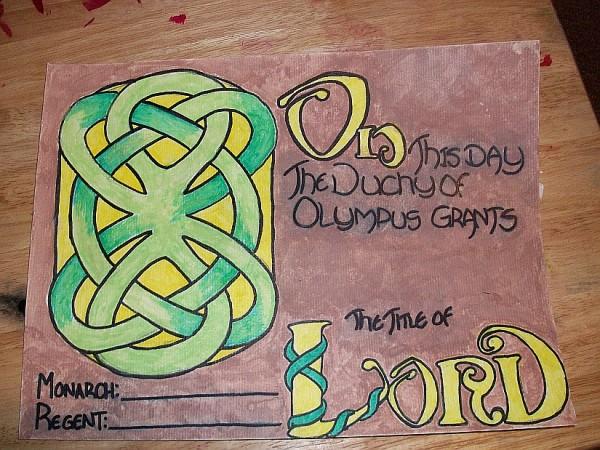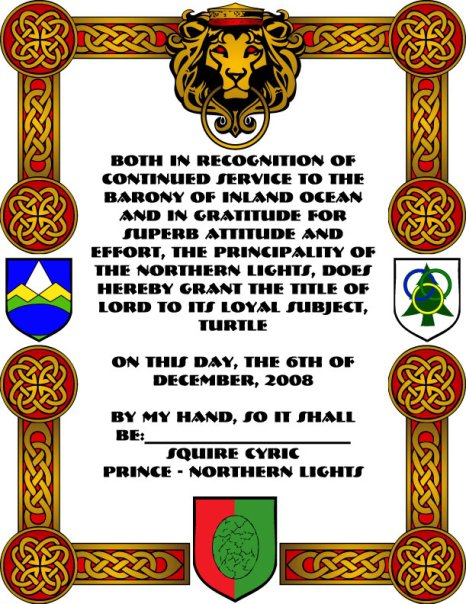Difference between revisions of "Lord"
| (15 intermediate revisions by 6 users not shown) | |||
| Line 1: | Line 1: | ||
| − | ===In the | + | ===In Amtgard=== |
| + | One of the standard Amtgard [[:Category: Titles|titles]]. Customarily bestowed for excellent service in office such as [[Sheriff]] in a [[Shire]] or other offices in larger groups. They are traditionally addressed as "My Liege", "My Lord", or "My Lady". | ||
| + | |||
| + | [[Image:L 73dd51400526456ca0d70d29f7ee6432.jpg|thumb|Example [[Award]] for the title of [[Lord]] made by [[Thorpe Skaldsonnir]]]] | ||
| + | |||
| + | ====Known Lieges, Lords, and Ladies==== | ||
| + | *[[:Category:Ladies|Ladies]] | ||
| + | *[[:Category:Lords|Lords]] | ||
| + | *[[:Category:Lieges|Lieges]] | ||
| + | |||
| + | ===Lord's Coronet=== | ||
| + | A Lord is allowed to wear a plain [[circlet]] without peaks, or with one small peak. | ||
| + | |||
| + | ===Historical Meaning=== | ||
[[File:Lordtitlebyalona.jpg|thumb|[[Title]] of [[Lord]] for [[Turtle]], made by [[Alona]] ]] | [[File:Lordtitlebyalona.jpg|thumb|[[Title]] of [[Lord]] for [[Turtle]], made by [[Alona]] ]] | ||
According to the Oxford Dictionary of English, the etymology of the word can be traced back to the Old English word 'hlāford' which originated from 'hlāfweard' meaning 'bread keeper' or 'loaf-ward', reflecting the Germanic tribal custom of a chieftain providing food for his followers. | According to the Oxford Dictionary of English, the etymology of the word can be traced back to the Old English word 'hlāford' which originated from 'hlāfweard' meaning 'bread keeper' or 'loaf-ward', reflecting the Germanic tribal custom of a chieftain providing food for his followers. | ||
| − | Lord is a title with various meanings. It can denote a prince or a feudal superior (especially a feudal tenant who holds directly from the king, i.e., a baron). The title today is mostly used in connection with the peerage of the United Kingdom or its predecessor countries, although some users of the title do not themselves hold peerages, and use it 'by courtesy'. The title may also be used in conjunction with others to denote a superior holder of an otherwise generic title, in such combinations as "Lord Mayor" or "Lord Chief Justice". The title is primarily taken by men, while women will usually take the title ' | + | Lord is a title with various meanings. It can denote a prince or a feudal superior (especially a feudal tenant who holds directly from the king, i.e., a baron). The title today is mostly used in connection with the peerage of the United Kingdom or its predecessor countries, although some users of the title do not themselves hold peerages, and use it 'by courtesy'. The title may also be used in conjunction with others to denote a superior holder of an otherwise generic title, in such combinations as "Lord Mayor" or "Lord Chief Justice". The title is primarily taken by men, while women will usually take the title 'Lady'. |
| − | |||
| − | |||
| − | |||
| − | + | ===Variants=== | |
| − | ==== | + | ====Feminine Variants==== |
*[[Lady]] | *[[Lady]] | ||
*[[Hiril]] | *[[Hiril]] | ||
| − | * | + | *Domina |
| − | * | + | *Fraulein |
| + | *Frú | ||
| − | ==== | + | ====Masculine Variants==== |
*Adon | *Adon | ||
*Dreadlord | *Dreadlord | ||
| Line 25: | Line 36: | ||
*Bal | *Bal | ||
*Daimyo | *Daimyo | ||
| + | *Seigneur | ||
| + | |||
| + | ====Gender Neutral Variants==== | ||
| + | *Captain | ||
| + | *Acolyte | ||
| + | *Gentle | ||
| + | *Noble | ||
| + | *Laird | ||
| + | *Liege | ||
| + | *Lux | ||
| + | *Suzerain | ||
| + | *Jūshoku | ||
| + | *Abbot | ||
===Player Notes=== | ===Player Notes=== | ||
| − | Can be found in the " | + | Before giving this award, Monarchs may find it useful to consult the recipient's friends and belted family to ensure the proper variant is given. |
| + | |||
| + | Can be found in the "In Their Own Words" pages or by following this link - [[About Lord]] | ||
| − | [[Category: Titles]] | + | [[Category: Titles]][[Category:Amtgard Terms]] |
Latest revision as of 15:14, 7 September 2024
Contents
In Amtgard
One of the standard Amtgard titles. Customarily bestowed for excellent service in office such as Sheriff in a Shire or other offices in larger groups. They are traditionally addressed as "My Liege", "My Lord", or "My Lady".
Known Lieges, Lords, and Ladies
Lord's Coronet
A Lord is allowed to wear a plain circlet without peaks, or with one small peak.
Historical Meaning
According to the Oxford Dictionary of English, the etymology of the word can be traced back to the Old English word 'hlāford' which originated from 'hlāfweard' meaning 'bread keeper' or 'loaf-ward', reflecting the Germanic tribal custom of a chieftain providing food for his followers.
Lord is a title with various meanings. It can denote a prince or a feudal superior (especially a feudal tenant who holds directly from the king, i.e., a baron). The title today is mostly used in connection with the peerage of the United Kingdom or its predecessor countries, although some users of the title do not themselves hold peerages, and use it 'by courtesy'. The title may also be used in conjunction with others to denote a superior holder of an otherwise generic title, in such combinations as "Lord Mayor" or "Lord Chief Justice". The title is primarily taken by men, while women will usually take the title 'Lady'.
Variants
Feminine Variants
Masculine Variants
- Adon
- Dreadlord
- Upper Classmen
- Hîr
- Laird
- Baal
- En
- Bal
- Daimyo
- Seigneur
Gender Neutral Variants
- Captain
- Acolyte
- Gentle
- Noble
- Laird
- Liege
- Lux
- Suzerain
- Jūshoku
- Abbot
Player Notes
Before giving this award, Monarchs may find it useful to consult the recipient's friends and belted family to ensure the proper variant is given.
Can be found in the "In Their Own Words" pages or by following this link - About Lord

